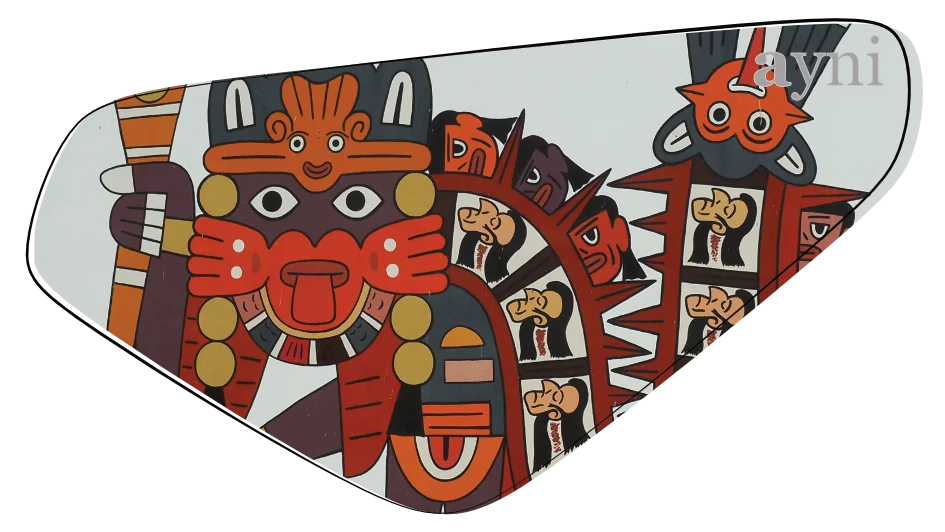🚀 Ancient Wisdom Meets Modern Leadership Part 3 🚀 26. Juni 2025

Inner Mastery for Outer Impact
Leading with clarity, compassion, and courage
In today's ever-evolving world of leadership, external tools and strategies are abundant. Yet true transformation and impact come from within. What if the key to effective leadership lies not in doing more, but in knowing ourselves more deeply? Ancient systems like Ayurveda and Samkhya offer profound insights into inner development that are remarkably relevant to modern leadership.
We often ask: What does it take to lead well? But perhaps the more powerful question is: Who must I become to lead with integrity, vision, and impact? The answer lies in developing our inner faculties—the subtle instruments of perception, judgment, and awareness that govern our behavior and choices.
Mapping the Inner World
According to Ayurvedic and Vedantic psychology, human consciousness is shaped by a constellation of faculties and layers of being:
Internal Faculties (Antahkarana):
- Manas – the sensory mind, which processes impressions
- Indriyas & Karmendriyas – the organs of perception and action
- Ahamkara – the ego or sense of "I"
- Buddhi (Dhi) – the intellect, responsible for discernment and decision-making
- Smṛti – memory and inner knowing
- Dṛti – the power of will and inner resolve
- Citta – the subconscious field that stores impressions (samskaras)
The Layers of Being (Koshas):
- Annamaya Kosha – the physical body (food sheath)
- Pranamaya Kosha – life energy or breath
- Manomaya Kosha – mind and emotion
- Vijnanamaya Kosha – wisdom and discernment
- Anandamaya Kosha – bliss or the innermost layer of joy
Beyond All Layers:
- Atman – the true Self, unchanging, eternal, and beyond ego or thought.
Understanding and working with these layers gives leaders a more nuanced sense of self-awareness, which can lead to better decision-making, emotional intelligence, and relational presence. These aren’t abstract ideas; they are precise lenses through which we can observe and refine how we think, act, and lead.
Why This Matters in Leadership
When Buddhi is clouded, decision-making suffers. When Ahamkāra dominates, ego overshadows empathy. A restless Manas leads to distraction and burnout. Without awareness of Citta, we repeat old patterns. When Smṛti (memory) is weak, we lose connection to our guiding principles. And without Dṛti (willpower), we waver in the face of challenge. Finally, when we lose touch with Ātman, our leadership becomes performative rather than purposeful.
Modern leadership challenges, navigating uncertainty, managing complexity, building ethical cultures, demand inner clarity as much as outer skill. Integrating these ancient faculties can shift us from reactive leadership to conscious, compassionate action.
Reflection in Practice
Leaders can begin with simple inquiries:
- Am I making this decision from clarity (Buddhi) or from fear and habit (Citta)?”
- Is my identity (Ahamkara) serving the greater whole or protecting the status quo?”
- What level of my being (Koshas) is asking for attention - physical exhaustion, mental fog, emotional fatigue?”
- Is my memory (Smriti) shaped by truth and wisdom, or by outdated patterns I’ve unconsciously stored?”
- Am I exercising will and inner resolve (Dhrti), or letting impulses and distractions steer my choices?”
Such questions invite pause and presence—two qualities in short supply but of high value.
Conclusion: Becoming the Leader Within
The journey of modern leadership isn’t just about achieving more, it’s about becoming more. Ayurveda and its inner models remind us that leadership begins not in the boardroom, but in the stillness of self-awareness. When we align our inner faculties, we lead from a place of clarity, compassion, and courage.
Ancient wisdom meets modern leadership in the space where inner development becomes the root of outer impact. And it’s from this space that the future of ethical, meaningful leadership will emerge.
“Mastering others is strength. Mastering yourself is true power.” — Lao Tzu
You can call this Ayurveda and ancient parctice or just simply the practice of living in sync with your true nature, fostering self-awareness and balance that empower authentic and conscious leadership.
What part of your inner constitution needs more attention today? And how might it transform the way you lead tomorrow?
Let’s Keep the Conversation Alive
If this exploration sparked something in you, curiosity, resonance, or simply a pause, I’d love to hear your reflections. These ideas are not meant to remain on the page but to be lived, tested, and shared.
Feel free to connect or reach out if you're curious to explore the inner side of leadership – or simply want to exchange thoughts on clarity, balance & purpose in today’s fast-paced world.
Send me a message or book a free discovery call – let’s get to know each other.
🌿 At ayni, I combine ancient wisdom with modern tools to help you reconnect with your inner strength, build resilience, and transform your life.
---
Welcome to ayni – Practice for Ayurveda Complementary Therapy, Consulting & Coaching. Curious to learn more? Write me: gruezi@ayni.ch
Photo by Silvia Ferlito, Murales Nasca Peru - Interpretation - the hundred minds